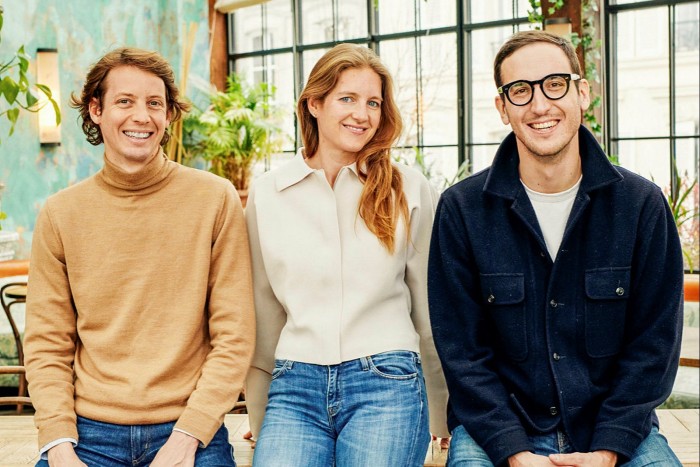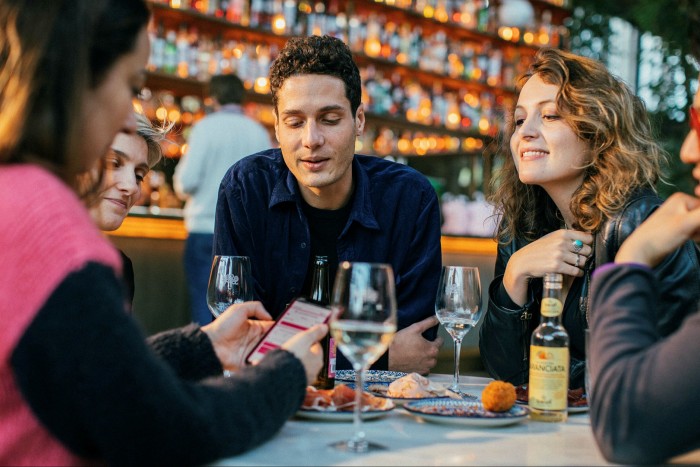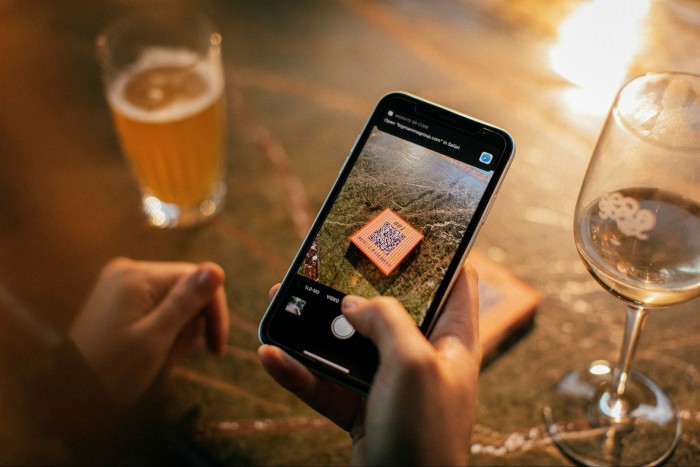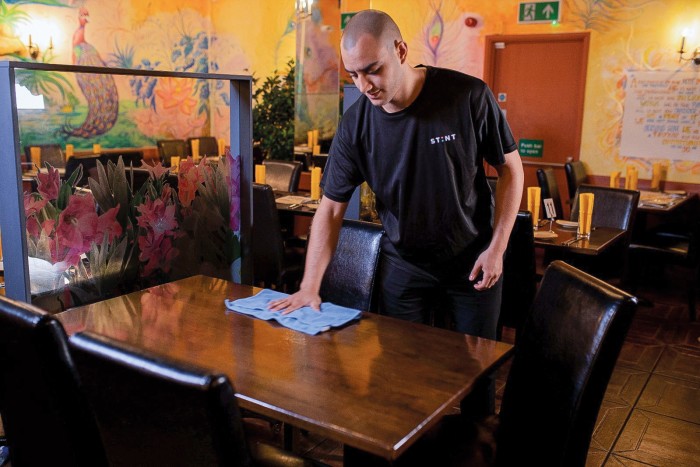Technology on the menu for Covid-hit restaurants

Simply sign up to the Travel & leisure industry myFT Digest -- delivered directly to your inbox.
Before the pandemic, the term “QR code” would have been anathema to many restaurateurs. But, says Jeremy King, chief executive of Corbin & King, which owns London restaurants The Wolseley (pictured above) and The Delaunay, “the pandemic makes all transitions easier”.
Speaking from his office in the 100-year-old Wolseley building, just down the road from The Ritz hotel, he says: “One of the few benefits that have come out of the pandemic is that it has advanced technology in what is a reactionary industry by at least three years, maybe more.”
One of the apps being trialled by Corbin & King, which owns seven London brasseries, is Sunday, a payment system. It was developed by restaurateurs for restaurateurs during lockdowns, based on what co-founder Victor Lugger calls “little more than an intuition”.
Lugger and his business partner, Tigrane Seydoux, run the Big Mamma group of trattorias, which is based in Paris and has venues in three other French cities as well as London and Madrid. Lugger realised that when his restaurants reopened after lockdowns last year, customers would want contactless payment and he would have to find cost efficiencies.
The Sunday system works by letting customers scan a QR code on their table with their phone and pay their bill without having to alert a waiter and use the card machine.
When the app was trialled at Big Mamma’s 14 sites, Lugger said the average spend per customer rose and tables were turned over more quickly because departing diners spent less time paying the bill.

Sunday cuts the commission that restaurant owners pay to credit card companies to process bills by at least half. In addition, the app increases the time waiting staff can spend with customers and thereby increases the amount they are likely to receive in tips. At Gloria, Big Mamma’s site in the City of London, tips have increased from £300 to £3,000 per week, Lugger says.
“We are not adding technology to the restaurant, we are just replacing the credit card machine,” he explains. “Fifteen minutes before you need to go, you don’t need to think about the bill. You have time for coffee and dessert.”
King says payment has always been the “dirty” part of eating out. “The perfect experience for a lot of people going to a restaurant is either to stand up and leave or sign a bill with a flourish and stand up and leave. Sunday gets as close to that experience as you could have.”
Anthony Hood, co-founder of Farm Girl, a chain of Australian-style cafés in London, says that, within a month of adopting Sunday in September, 70 per cent of sales at the company’s Notting Hill venue were going through the app. “There is a risk that people leg it but, on the whole, people are honest and pay the full amount,” he says.
Sunday has no set-up fees, fixed charges or minimum spend. It takes a commission of between 0.5 and 1 per cent — roughly half the amount credit card companies charge restaurants — and has 30 different point-of-sales systems integrated into its app.
In September, five months after it launched, the company raised $100m in a series A funding round led by Philippe Laffont’s Coatue Management.


Marginal savings of the kind offered by Sunday have been welcomed by restaurants that have spent much of the past 18 months shuttered and building up debt. Order and payment apps such as Sunday, Zapaygo and Round are receiving increasing levels of interest from the cash-strapped hospitality industry.
The order-to-table app Round has attracted more than 500 restaurant and pub companies to its platform, as well as 25 universities and 400 independent hospitality venues, while Sunday says it has signed up 1,500 restaurants across the UK and Europe, as well as the US (the company’s other co-founder, Christine de Wendel, is US chief executive, based in Atlanta) and that it processes $2m of bills a week. “The end of the pandemic is accelerating the change,” Lugger says.
What he did not foresee, but is something that has also fuelled Sunday’s success, is that while post-lockdown demand to eat out has rocketed, restaurants have been forced to turn away customers because of a lack of staff.
The uncertain future for hospitality businesses, which could be shut again should coronavirus rates rise, has caused thousands of waiters, kitchen porters, chefs and bar staff to leave the industry in search of more stable work.
UKHospitality, the trade body, estimates the industry is about 10 per cent short of the labour it needs. Lugger says Big Mamma, whose staffing levels are 7 per cent below what it requires, has had less of a labour problem than the wider hospitality sector — because of Sunday. Lugger says the app has improved his staff’s quality of work, because they have 40 per cent more time to talk to customers, rather than dealing with bills.
Steve Holmes, chief executive of Azzurri, which owns the Zizzi and Ask Italian chains, says technology will not replace staff but should “make their job more enjoyable so they can have a better work-life balance and get paid more”.

At The Wolseley, King says he has also turned to technology — specifically, the app Stint — to fill labour shortages. Stint works in a similar way to other gig-economy concepts: it matches students seeking short shifts with restaurants that need labour for basic tasks such as polishing glasses or laying tables. Some 100,000 students are registered to the app.
Benoit Massonneau, operations director at Swan at The Globe restaurant in London, says Stint has enabled the restaurant to cope with the spikes in demand that have followed lockdowns. “[Sales] can go from £100,000 to £200,000 a week. It depends on the levels of events we have in. We need to adapt with the current situation and Stint brings us more flexibility,” he says.

As well as streamlining operations with QR code-based ordering technology, Swan at The Globe uses about 20 students a week recruited via Stint. “Life changed completely after Covid and now no one is picky [about staff]. We are just looking for a pair of hands,” Massonneau says.
Sol Schlagman, who co-founded Stint when he and his brother were looking for work at university, says the app frees up trained staff to serve customers and might bring more full-time young talent into the industry.
The basic hourly rate for students registered to Stint is £8.92, with restaurateurs paying £10.99 and Stint taking the difference.
Lugger believes the advantage of apps such as Sunday and Stint is that they have been developed by those with experience of an industry that works on thin margins and involves many different skill requirements, costs and customer demands.
He has big ambitions for the Sunday project, which he now runs full-time, leaving Seydoux to manage the restaurants. He is targeting as much of the $7.5tn global hospitality market as he can enable Sunday to reach. For example, he is developing ordering capabilities to integrate with its payment technology so that it can be used for hotel room service or in noisy nightclub bars.
Lugger also wants to integrate different operators’ loyalty schemes into the app so that restaurants can capitalise on the data. Hotel check-in and, eventually, near-field communication technology enabling payment without scanning a QR code are also on his list. Instead, a wireless device under the table will recognise customers’ phones. “We are going to make bricks and mortar as seamless as online,” he says.
Comments